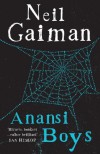William's Book Blog
Mostly book reviews. Very rarely I'll allow William Campbell Powell (author) to write a blog entry on publishing activity, but he's under orders to keep that stuff over on his Facebook page and on http://williamcampbellpowell.com
Currently reading
Independent Booksellers Mount Offensive Against Amazon's Dominance
Reblogged from Sharon E. Cathcart
Reluctant, or Just Not Interested?
This August the World Science Fiction Convention comes to London. Hooray! Rather than wander endlessly round booths, I felt I should be doing something, so I now find myself on a panel with 4 other authors, discussing "Reluctant, or Just Not Interested?" , subtitled "Are reluctant readers being failed by the education system, or is the publishing industry just not giving them what they want?".
My initial reaction was "why me?" (I didn't choose the topic), but on reflection, I'm rather up for the challenge. So if anyone has experiences of reluctant readers they're willing to share, please let me know.
Little Brother dropped by Florida School for incitement of 'questioning authority'

A very reasoned and reasonable response from Cory Doctorow and Tor books. Also other links http://craphound.com/?p=5213 and http://boingboing.net/2014/06/06/why-im-sending-200-copies-of.html .
I do hope the school sees sense - it appears most of the teachers actually want to study the book, but there have been a few isolated complaints by parents afraid of radical ideas.
 1
1
Poddy and Me
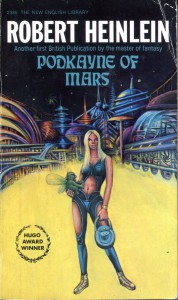 It's possibly half a lifetime since I last read this book, an old edition with the upbeat ending forced on Heinlein by his publisher.
It's possibly half a lifetime since I last read this book, an old edition with the upbeat ending forced on Heinlein by his publisher.
I didn't realise quite how deeply this book had sunk into my hindbrain. Re-reading it after at least two decades, I can see its footprints all over my writing, and particularly upon the style I adopted for Expiration Day. It's quite spooky.
So I'm not sure how this review will work out. On the one hand, the book is a favourite, one of the key building blocks of who I am as a writer. So there's an intensely personal aspect to the review - how could I not love it and give it five stars? On the other hand, it is a "period piece", dating from the early sixties, predating the whole women's emancipation movement of that decade. Anticipating it too, perhaps, but incompletely.
Podakayne is a teen who wants to be a space pilot in a future where this is still seen as a male-dominated profession. Humanity is still locked within the solar system, but a solar system with colonies on Mars and Venus, the major moons and asteroids. The Venus is that favourite - hot, teeming with life, life bristling with sharp teeth - and owned by a single corporation (think the Venus of The Space Merchants meets the Mars of the film Total Recall).
It's quite short, as a book, and rather too much of it is Poddy's Adventures in Space, where Podkayne Meets Interesting People and Has Adventures. There are Lots of Capitals for emphasis of Important Points, because the book is written as Poddy's Journal and that's what Poddy Does. It gets a bit wearing, as does the story - the danger is fairly nominal.
Even once arrived on Venus, it's a rich girl's tour - money is no object, she's escorted by the handsome and well-connected Dexter, the son of the corporation's senior executive. She doesn't even have to fight him off very hard - chivalry is Dexter's middle name, though he makes it very clear what he's interested in. There's a lot of the mindset of pre-liberation, pre-contraception times, where a woman had to "protect her virtue". Such a notion would baffle modern readers - it's as atavistic as finding the Bronte sisters writing YA/SF.
Only in the last few chapters does the dream come crashing down in a hasty ending, with a dark villain, only prevented from twirling the moustache in an evil manner by dint of being an elderly female. Then, in short order, the villainess is defeated to either an upbeat or a tragic outcome, depending on which version of the book you pick up.
I still love this book for many reasons, most of which have no validity outside my skull. Judging against what else was available for the proto-YA reader at the time, it's probably at least a head, possibly shoulders too, above the rest. Judging by today's standards, however, it would be lucky to get two stars.
On the grounds that books should be judged at least partly in the context of its own time, not solely on how it works today, I'll be more generous.
Podkayne of Mars
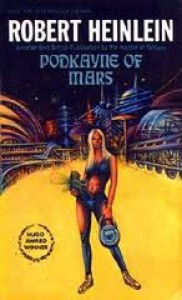 Poddy and Me
Poddy and MeIt's possibly half a lifetime since I last read this book, an old edition with the upbeat ending forced on Heinlein by his publisher.
I didn't realise quite how deeply this book had sunk into my hindbrain. Re-reading it after at least two decades, I can see its footprints all over my writing, and particularly upon the style I adopted for Expiration Day. It's quite spooky.
So I'm not sure how this review will work out. On the one hand, the book is a favourite, one of the key building blocks of who I am as a writer. So there's an intensely personal aspect to the review - how could I not love it and give it five stars? On the other hand, it is a "period piece", dating from the early sixties, predating the whole women's emancipation movement of that decade. Anticipating it too, perhaps, but incompletely.
Podakayne is a teen who wants to be a space pilot in a future where this is still seen as a male-dominated profession. Humanity is still locked within the solar system, but a solar system with colonies on Mars and Venus, the major moons and asteroids. The Venus is that favourite - hot, teeming with life, life bristling with sharp teeth - and owned by a single corporation (think the Venus of The Space Merchants meets the Mars of the film Total Recall).
It's quite short, as a book, and rather too much of it is Poddy's Adventures in Space, where Podkayne Meets Interesting People and Has Adventures. There are Lots of Capitals for emphasis of Important Points, because the book is written as Poddy's Journal and that's what Poddy Does. It gets a bit wearing, as does the story - the danger is fairly nominal.
Even once arrived on Venus, it's a rich girl's tour - money is no object, she's escorted by the handsome and well-connected Dexter, the son of the corporation's senior executive. She doesn't even have to fight him off very hard - chivalry is Dexter's middle name, though he makes it very clear what he's interested in. There's a lot of the mindset of pre-liberation, pre-contraception times, where a woman had to "protect her virtue". Such a notion would baffle modern readers - it's as atavistic as finding the Bronte sisters writing YA/SF.
Only in the last few chapters does the dream come crashing down in a hasty ending, with a dark villain, only prevented from twirling the moustache in an evil manner by dint of being an elderly female. Then, in short order, the villainess is defeated to either an upbeat or a tragic outcome, depending on which version of the book you pick up.
I still love this book for many reasons, most of which have no validity outside my skull. Judging against what else was available for the proto-YA reader at the time, it's probably at least a head, possibly shoulders too, above the rest. Judging by today's standards, however, it would be lucky to get two stars.
On the grounds that books should be judged at least partly in the context of its own time, not solely on how it works today, I'll be more generous.
Garba - dale
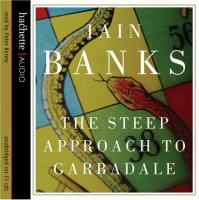
Mostly positives here.
It was an audiobook, narrated by the excellent Peter Kenny, which is a good start point. Versatile range of accents, making the characters instantly recognisable, because he's just so consistent.
A nicely convoluted plot around a sprawling wealthy family, the clan Wopuld, complete with black sheep, set against the background of a bid by a US games corporation to buy out the family firm. A powerful (but aging) matriarch, devious and unscrupulous. Skulduggery. Some well-concealed plot twists. Teenage lust à la Adrian Mole turning to middle-aged angst in the mostly-sympathetic protagonist, Alban McGill. Some lovely comedy from aunts Beryl and Doris.
Some negatives, though.
Many of the characters are stereotypes - Fielding, for example, and Cousin Sophie (the object of Alban's teenage lust). They lack depth, though you might defend this on the grounds that the tale is told from Alban's point of view, and the narrative reflects that Alban never really tried to understand his relatives. Even Sophie, whom he never sees as more than the object of his sexual desires.
The story takes a while to get going. The first chapter almost lost me - we meet Fielding first of all and there's no empathy - he's just a wealthy businessman, thrust into a Scottish slum, petrified that his car will be stolen (or keyed).
But then the first plot twist - he's agin the takeover. Suddenly I like him, and my interest in the book picks up. It drags again though in the following chapters. We get a guided tour of Alban's teenage years, his first meetings with Cousin Sophie, and it becomes very meandering and (as I said) Adrian Molesque. In hindsight, a lot of what happens here feeds into later twists, but at the time it just feels like Iain Banks is indulging in teenage male fantasy.
The final negative is Alban's atheistic rants and introspective musings, which just went on and on at times. It's a facet of many of Banks' writing, normally kept somewhat under control, but here it got downright fiery-preachy, sentences piled one upon another, as Banks restates his beliefs just in case you didn't get it the first time.
The novel gets going again as the moment draws closer when the decision on the sale will have to be made. Interleaved, we learn that there's a mystery that surrounds Alban's birth, and the suicide of his mother. Black sheep, secrets and skulduggery...
The threads all come together reasonable neatly, if a little predictably. There's a nice little coda, too, showing Alban apparently at peace with himself.
In hindsight, it feels like another Espedair Street. That's OK, too.
Reading progress update: I've read 95%.

The thing about listening to a good audiobook is that after a while you can't remember a time when you listened to anything else on the daily commute.
I've got just 8 minutes left (out of 13+ hours) to listen to, and I'm really going to miss this book when it's done and gone. Peter Kenny is a fantastic narrator (as always), who brings the Wopuld clan to life brilliantly.
There are some things I won't miss - the protag's atheistic rantings and other introspective musings were all too easy to tune out in the traffic. Quite a few of the characters were a bit 2D (I was going to write "flat", but that could not be said of Sophie). Unsympathetic.
But this is Alban's story, and Alban's journey and I've really enjoyed the ride, seeing him grow up and mature and (in more analytical frame of mind) seeing how all the trivia Banks inserts turns out to have been important.
Review in 8 minutes?
No. Tomorrow.
Fair Coin by E C Myers - to toss or not to toss?

Following on from my recent excursion into the current Nebula crop, my wife asked me to choose some older Nebula winners for her to read. Our choice was influenced by what was available either from the library or cheap on amazon, so this - the 2012 Andre Norton winner - was what came up.
So far the cover blurb has been pretty accurate - a coin that appears to grant every wish, but with side effects that are less desirable. So far, the protag, Ephraim, is using his wishes to sort out his mother's broken life, and a variety of he-loves-her-but-she-loves-somebody-else teen relationships. Hmm.
In that respect the plot is not much different to A Midsummer Night's Dream as Puck manipulates the affections of Demetrius, Lysander, Hermia and Helena. We have Ephraim, Nathan (boys) but 3 girls (Mary, Shelley and Jena). So one of the girls is going to be left out in the cold.
Shakespeare puts the moral responsibility for such choices with Oberon, deeming humans not capable of making wise choices. In Fair Coin, Ephraim is choosing for himself, so his choices reflect a very human selfishness - me first, then my mate; the girls desires don't count much and they are the ones whose affections get manipulated.
So at about the 40% mark Ephraim reaches the danger point - "just one more change to put it all right, and then I'll stop" - where "all right" means "all right for him and for Nathan".
At that point it all changes - there's an infodump which takes the book out of the realm of teenage wish-fulfilment and into something more scientific. It also resolves some hints laid down earlier and gives us an antagonist for Ephraim and his chosen girl(s) to battle against.
The antagonist is strong and knows what's going on, and is totally ruthless (the body count rises), whereas Ephraim is physically weaker, doesn't yet understand the coin, and is showing a highly moral side. It's all down to whether Ephraim and his allies can outsmart the villain.
The science wobbles between the plausibility of the theory and the implausible nature of the technology that implements the physics. In effect the science is cut down for the audience and the technology is simply handwavium with exactly the right properties to let Myers construct his drama.
Which he does very effectively. The wrap-up is neat, displays Ephraim's moral growth (mostly - his disposition of the antagonist is akin to dropping someone in the middle of a minefield and then claiming you're not responsible) with considerable effort to right wrongs (with some comedy along the way) and balance being somewhat messily restored. There's no way to undo the death toll, though, and putting Humpty together again involves some hard choices and some tears.
Pro: the novel rises above being a teenage wish-fulfilment fantasy, and tackles the morality of power. It's a good introduction to aspects of physics, so long as you don't take it too literally. If you do break Humpty Dumpty, the repair is never going to be perfect - that's life.
Con: the second quarter of the book squanders the early empathy built up with Ephraim, up to the point where he finally realises the selfishness of his actions. You have to push through that bit to get to the meat of the book. The technology doesn't match up to the science.
A good read, on balance.
 1
1
The Steep Approach to Garbadale
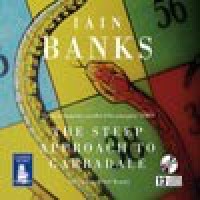 Garba - dale
Garba - daleMostly positives here.
It was an audiobook, narrated by the excellent Peter Kenny, which is a good start point. Versatile range of accents, making the characters instantly recognisable, because he's just so consistent.
A nicely convoluted plot around a sprawling wealthy family, the clan Wopuld, complete with black sheep, set against the background of a bid by a US games corporation to buy out the family firm. A powerful (but aging) matriarch, devious and unscrupulous. Skulduggery. Some well-concealed plot twists. Teenage lust à la Adrian Mole turning to middle-aged angst in the mostly-sympathetic protagonist, Alban McGill. Some lovely comedy from aunts Beryl and Doris.
Some negatives, though.
Many of the characters are stereotypes - Fielding, for example, and Cousin Sophie (the object of Alban's teenage lust). They lack depth, though you might defend this on the grounds that the tale is told from Alban's point of view, and the narrative reflects that Alban never really tried to understand his relatives. Even Sophie, whom he never sees as more than the object of his sexual desires.
The story takes a while to get going. The first chapter almost lost me - we meet Fielding first of all and there's no empathy - he's just a wealthy businessman, thrust into a Scottish slum, petrified that his car will be stolen (or keyed).
But then the first plot twist - he's agin the takeover. Suddenly I like him, and my interest in the book picks up. It drags again though in the following chapters. We get a guided tour of Alban's teenage years, his first meetings with Cousin Sophie, and it becomes very meandering and (as I said) Adrian Molesque. In hindsight, a lot of what happens here feeds into later twists, but at the time it just feels like Iain Banks is indulging in teenage male fantasy.
The final negative is Alban's atheistic rants and introspective musings, which just went on and on at times. It's a facet of many of Banks' writings, normally kept somewhat under control, but here it got downright fiery-preachy, sentences piled one upon another, as Banks restates his beliefs just in case you didn't get it the first time.
The novel gets going again as the moment draws closer when the decision on the sale will have to be made. Interleaved, we learn that there's a mystery that surrounds Alban's birth, and the suicide of his mother. Black sheep, secrets and skulduggery...
The threads all come together reasonable neatly, if a little predictably. There's a nice little coda, too, showing Alban apparently at peace with himself.
In hindsight, it feels like another Espedair Street. That's OK, too.
Giving Fair Coin a Fair Chance

Following on from my recent excursion into the current Nebula crop, my wife asked me to choose some older Nebula winners for her to read. Our choice was influenced by what was available either from the library or cheap on amazon, so this - the 2012 Andre Norton winner - was what came up.
So far the cover blurb has been pretty accurate - a coin that appears to grant every wish, but with side effects that are less desirable. So far, the protag, Ephraim, is using his wishes to sort out his mother's broken life, and the variety of he-loves-her-but-she-loves-somebody-else teen relationships. Hmm.
In that respect the plot is not much different to A Midsummer Night's Dream as Puck manipulates the affections of Demetrius, Lysander, Hermia and Helena. We have Ephraim, Nathan (boys) but 3 girls (Mary, Shelley and Jena). So one of the girls is going to be left out in the cold.
Shakespeare puts the moral responsibility for such choices with Oberon, deeming humans not capable of making wise choices. In Fair Coin, Ephraim is choosing for himself, so his choices reflect a very human selfishness - me first, then my mate; the girls desires don't count much and they are the ones whose affections get manipulated.
So at about the 40% mark Ephraim has reached the danger point - "just one more change to put it all right, and then I'll stop" - where "all right" means "all right for him and for Nathan". But Nathan also knows what's going on, and is probably going to step in, and he has even less moral self-discipline than Ephraim (who at least has reached the point where he's resolved not to change people).
To be worthy of that Nebula/Andre Norton this novel needs to move beyond teenage wish-fulfillment, and I think it's about to do so (if it doesn't, this'll be a DNF). It needs to recognise the rights of each of the participants to free will and self determination. For me, the obvious way to this is for Ephraim to journey to the point where he just says "put it all back the way it was before I started tinkering" and then destroy the One Ring by casting it into Mount Doom. Sorry - wrong book. I mean, of course, for Ephraim to put the Fair Coin beyond use. Even if it means his mother reverts to a broken-down alcoholic.
I shall be intrigued to see if Myers has a better solution. For it to be acceptable I demand that Ephraim's use of the Fair Coin be on a better moral basis than "I have the Coin, and I promise that I will use it carefully from now on for Justice and the American Way of Life", which is no better than typical flawed superhero morality.
Of course, this is all founded on the assumption that Ephraim isn't just choosing to wander across multiple strands of a multiverse until he finds one that suits him. In which case, I'm expecting a make-the-best-of-where-you-fetch-up ending, akin to Robert Sheckley's Mindswap or Dimension of Miracles.
Let's see.
 1
1
Mad Scientists? -or Historians?

I really liked the dry humour of this one. Instead of mad scientists we get mad historians with time machines, equally able to make things go bang, and living proof that no battle plan _ever_ survives contact with ... reality.
Style-wise it reminded me of Eric Frank Russell, especially his "Men, Martians and Machines", and perhaps Harry Harrison (Bill, the Galactic Hero).
It took a while to get through the scene-setting and into some genuine "adventures". I did wonder if it was going to turn into something like Larry Niven's The Flight of the Horse - a succession of themed tales tied together by a technology, some characters and the author's desire to spin some time travel yarns with a bet-you-didn't-see-that-coming ending to each.
But then it changed, and I realised the body count was climbing, and there seemed to be a darker force at work.
At that point I started to read faster, because I was enjoying the story, and that may have been a mistake. I lost track of who the male leads were - I'd been sure the main (female) protag seemed to be involved with just one of them, but I'd forgotten which.
There was the Boss and the Chief - and I think I got it straightened out their respective ranks and specialities, and a variety of characters with names beginning with M. Then the body count climbed further and we suddenly got non-historians roped in, and every male just became a potential redshirt.
An early plot device - the space-time continuum's ability to drop large blocks of stone on top of any historian who threatened to disturb the established timeline - just disappeared in the second half of the book, when it would have become way too inconvenient and would have seriously impeded both the booming villainy and also the heroes' attempts to thwart it.
I loved the story and the style, but the redshirt-nature of the male characters and the lack of rigour to the rules of time travel lose a star and a half.
I shall most likely read the next book in the series.
 1
1
Nebula Award winners announced
This the Science Fiction Writers of America voting for the best of 2013. I can't really comment on most of the categories, because there were only five weeks for voting, and with a full-time job, I couldn't fit in all the nominees.
I did read all the short stories and also the Andre Norton nominees for YA.
While ‘‘If You Were a Dinosaur, My Love,’’ by Rachel Swirsky, wasn't my personal choice, it is a worthy winner.
I will say, however, that Nalo Hopkinson's "Sister Mine" was head and shoulders above the competition, and I'm absolutely delighted that it won. My review is at http://williamcampbellpowell.booklikes.com/post/835578/sister-mine-nebula-andre-norton-shortlist-
My complete thoughts on as many of the nominees as I managed to read are at http://williamcampbellpowell.com/default.asp?Page=Nebulas
 1
1
Just One Damned Thing After Another (The Chronicles of St. Mary's Series)
 Mad Scientists? -or Historians? I really liked the dry humour of this one. Instead of mad scientists we get mad historians with time machines, equally able to make things go bang, and living proof that no battle plan _ever_ survives contact with ... reality.
Mad Scientists? -or Historians? I really liked the dry humour of this one. Instead of mad scientists we get mad historians with time machines, equally able to make things go bang, and living proof that no battle plan _ever_ survives contact with ... reality.Style-wise it reminded me of Eric Frank Russell, especially his "Men, Martians and Machines", and perhaps Harry Harrison (Bill, the Galactic Hero).
It took a while to get through the scene-setting and into some genuine "adventures". I did wonder if it was going to turn into something like Larry Niven's The Flight of the Horse - a succession of themed tales tied together by a technology, some characters and the author's desire to spin some time travel yarns with a bet-you-didn't-see-that-coming ending to each.
But then it changed, and I realised the body count was climbing, and there seemed to be a darker force at work.
At that point I started to read faster, because I was enjoying the story, and that may have been a mistake. I lost track of who the male leads were - I'd been sure the main (female) protag seemed to be involved with just one of them, but I'd forgotten which.
There was the Boss and the Chief - and I think I got it straightened out their respective ranks and specialities, and a variety of characters with names beginning with M. Then the body count climbed further and we suddenly got non-historians roped in, and every male just became a potential redshirt.
An early plot device - the space-time continuum's ability to drop large blocks of stone on top of any historian who threatened to disturb the established timeline - just disappeared in the second half of the book, when it would have become way too inconvenient and would have seriously impeded both the booming villainy and also the heroes' attempts to thwart it.
I loved the story and the style, but the redshirt-nature of the male characters and the lack of rigour to the rules of time travel lose a star and a half.
I shall most likely read the next book in the series.
Revelation Space
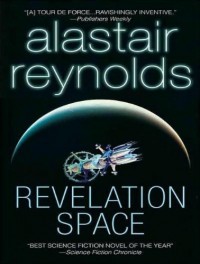
Well, I managed to avoid the DNF on this one, and indeed managed to get back to a point where I rather enjoyed the ride.
I had a couple of possible outcomes for the novel. One in which all the villains and minor characters die, and all the major protagonists survive. The other in which some of the villains get their comeuppance, but by no means all, and in which at least one major character dies, probably saving humanity as far as that is possible. And that's properly dies - none of this reincarnation as an AI nonsense. If I'd been reading Iain M Banks, I wouldn't have bet on either outcome over the other.
I'll avoid the spoiler. Suffice to say I wasn't entirely pleased with Alastair Reynolds' rabbits and hats.
Faults first, and those specific to the audiobook - the narrator (John Lee) is poor.
- The emphasis is practically identical for every sentence - he starts forte then fades to a mezzo piano, almost piano by the end.
- His range of accents is frustratingly small. He has one French accent, which he uses for every inhabitant of one world, regardless of age or gender. The starship crew get a hybrid Russian/Japanese accent, which is somewhat erratic.
- His pauses as he switches between the starship and one or other of the two planets are too short to be worthy of the name. Too many times I find myself a paragraph or two into a new scene before I realise there's been a change, and I have to work out where I am and who is now on stage. Mental rewind - no, missed it. Bah!
General faults:
- "Quadrant 5" - really? Is it no longer a requirement for authors to understand the etymology of the words they use?
- Too much repetition, too many infodumps (sometimes the same infodump repeated for the benefit of a new character who didn't hear the first one).
- The alpha copy of Dan Sylveste - a plot point that wasn't, at least not in this book. A red herring?
- The computer security was inconsistent - lax or strong as the plot needed it.
- Sunstealer's potency or impotency was likewise variable, according to the needs of the plot.
Some positives:
- A surprising level of empathy built up with Volyova over time. Likewise Khouri.
- The descriptions of the light-hugger ship - like the Nostromo, but with intelligent rats, a rotting infrastructure and sludge/slime. However it is not explained how the rats survive the acceleration that kills a rogue crewmember. Nor what happens to all that liquid under the same acceleration.
Still, it is a good adventure, though the ending is just too pat. The audiobook is harder work than it needs to be.
 1
1
Authors and Readers - Friends or Foes?
I was invited to write a guest post over on Nerdophiles. As a relative newbie, I've stuck my head above the parapet, offering my thoughts on the state of relations between author and reader/reviewer.
 2
2


